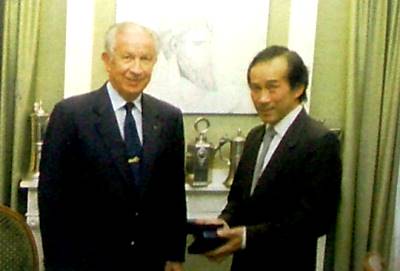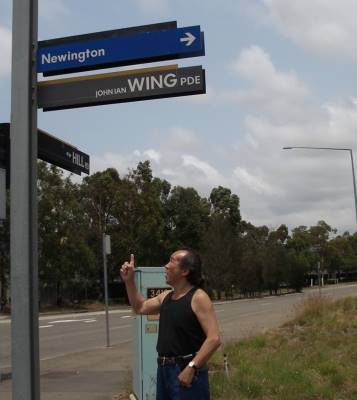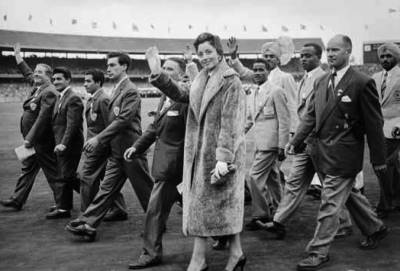John Wing
A schoolboy
saved the Olympic Games
The 1956
Olympic Games was staged in
A number of
countries boycotted the 1956 Games as a protest, whilst others wouldn’t
allow
their athletes to mix with other athletes in the Village. The final straw came for
the organizers, when
Russian and Hungarian players fought each other during the water polo
match. The police
had to separate the
players and the match was cancelled because there was so much blood in
the
pool.
The IOC and the Organizing Committee had by now given up all hope of saving the Games from ending in failure. That was, until they received an anonymous hand written letter from a 17 year old Chinese student. The boy had an ‘idea’ that turned the Games into a success and the 1956 Melbourne Olympic Games became officially known as the Friendly Games.
President
Samaranch invites John Ian Wing to the IOC`s Headquarters in Lausanne
in 1992
The boy was
later identified as John Ian Wing and this is his story:
When I was
about 14 years old I wanted to take up some sport at school but I
wasn’t that
keen on doing football or cricket, so I went to the library and took
out a book
on the Olympic Games. Now
I could study
all the different sports and find one which I would like to do. I eventually decided to do
the sprints. Reading
through the book I was awe struck by
the sheer spectacle of the Opening Ceremony and to see athletes from
all around
the world in their smart uniform marching into the stadium behind their
national flag. They
must have felt so
proud. But I
thought it was strange that
the athletes were not allowed to take part in the closing ceremony. The final day of any
sporting event is where
you celebrate all the victories, and say goodbye to all the new friends
you
have made, but not the Olympic Games.
This
was due to the protocol of the Olympic Charter.
In 1956,
the Olympic Games came to my home town of
I was
observing all what was going on and it saddened me to see politicians
were
using the Olympics for their political gains and the athletes were a
‘pawn’ in
their game. It was
pointless to scream
and shout at politicians because it goes in one ear and out the other
ear. But
I remembered an old saying, “The pen is mightier than the sword”. It was a Thursday evening;
on the Saturday
was the closing ceremony, so I didn’t have much time to come up with a
solution
and write my letter. Then
I remembered
reading about the Olympic Games and the closing ceremony. At first I thought of
organizing a big party
on the last day for all the athletes and spectators in the stadium. I soon dropped that idea. As the athletes march into
the stadium as
separate nations during the opening ceremony, why don’t we get them to
join and
intermingle and form one Olympic Nation and enter the stadium during
the
closing ceremony. This
way the
politicians could not separate their athletes, as they will walk behind
the
Olympic flag.
I didn’t
put my name or address to the letter in case someone thought it was a
daft idea
and then, I went to the office of the Organizing Committee, which was
just down
the road from where I lived and put it through the letter box. On the Saturday morning I
checked the
newspapers to see if my idea had been adopted but there was nothing in
the papers,
being a little disappointed I went to the movies that day. Coming out from the
movies, I saw a group of
people outside a shop window and they were watching the closing
ceremony. In those
days, very few people owned a tv
set. I saw the
athletes had all joined
up to form one group and was walking casually, laughing and waving to
the crowd
in the stands. I
thought to myself, I
wonder if that was my idea. As
there
were no weekend papers, I had to wait until Monday morning to find out. I got up early in the
morning and bought all
the newspapers and on the front page of every paper was my story and my
letter. On my way
to school, I decided
not to tell my school mates because they would not have believed me. I also did not tell my
parents because being
Chinese, you should always seek your parents permission if you want to
write to
the authorities.
I decided to remain anonymous for I had done my job and saved the Games from ruin and helped to restore the integrity of the Olympic Movement. I wrote a second letter to Wilfrid Kent Hughes whom I had written my first letter to, and gave him my name and address, but I asked to remain anonymous. For the
first time in the History of Mankind and Olympic History, men and women
came
from the four corners of the globe, regardless of their nationality,
colour or
religion, to join together and mingle freely, and to walk as One Nation. And amidst all the global
tension and
political unrest of the 1950s, they walked together laughing, waving to
the
crowd, conveying a message of goodwill, peace and harmony to the world. Some of the countries were
at war with each
other, but for that brief moment in time, war, politics and nationality
were
all forgotten. That
is the power of the
Olympic Movement.
If you care to read my full story you can go to my website: www.johnwing.co.uk
|


